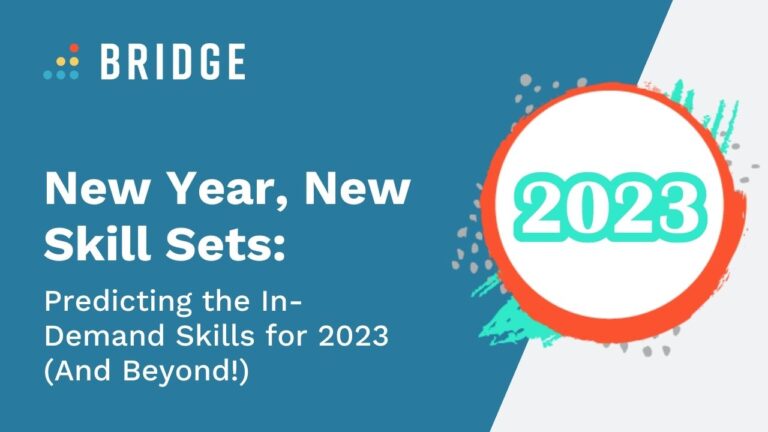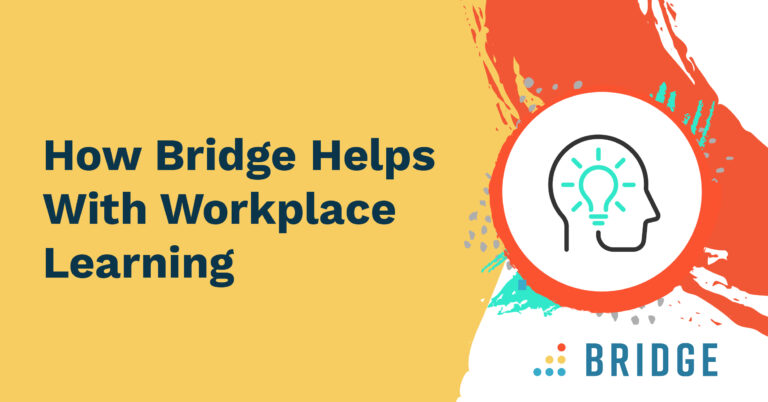Want to make sure your employees have the skill sets required to thrive in the year ahead?
Bridge’s experts have predicted some of the top skills you’ll need in 2023 across a range of fields, from software to sales. 2023 is likely to bring with it a shift in the way many organizations approach skills, hire new talent, and use their LMSs to support and upskill existing employees.
Research suggests that skills gaps have been on the minds of most business leaders in recent years. As such, job descriptions created in the year ahead will place less emphasis on what future hires need to do, and more emphasis on the skills they need to have.
For managers, this approach to skills will require a high aptitude for recognizing skill maturity among their people. It will also be all the more essential to support employees with good learning content, providing them with the resources they need to sharpen and extend their skill sets.
This doesn’t mean that managers need to hold all the technical knowledge of their future hires—but they do need to know where to find it.
As such, it’s never been more essential to have a thorough grounding in the skills that matter. With the help of our expertly curated predictions, discover the skills to look out for across six key disciplines.
Tell Stories Through Content Creation
In the world of content creation, storytelling has long been at the forefront of any skills-related wishlist. And the urgency is growing!
After all, giving people the ability to create learning content in various media doesn’t mean they’ll automatically create good content. This is especially true of tools like Bridge, which make content creation highly accessible to all users—not just instructional designers.
That’s why a variety of roles will benefit from a strong storytelling skill set. This is more than communication: it’s the ability to tell a clear, concise, and compelling story about a specific topic.
CX: Learning and Upselling: The New StandardTeams
Microlearning isn’t a tricky concept. As its name suggests, microlearning is all about boiling down learning material to its essentials, making content easily digestible. It’s often delivered in bite-sized chunks, and practitioners usually place an emphasis on content that’s easy to understand and consume.
It’s not too difficult to implement, either. The process of creating microlearning can be as simple as taking a pair of scissors to your existing content, breaking up video material, and reducing written courses to their fundamental messages.
Delivering this kind of learning is, without question, the ideal way to encourage your learners to make time for learning—after all, you’re only asking them for a tiny amount of time, sidestepping some of the issues caused when you place an hours-long course on top of an already teetering to-do list. Better still, microlearning comes with a handy host of further advantages: it’s easily personalized, it’s simple to update, and—most importantly—it actually helps your employees to learn at their best by improving knowledge retention, too!
One survey of learning professionals found that a substantial 71% of respondents could see the potential for microlearning to improve retention, and their instincts have been borne out in similar pieces of research.
For example, in a study published in BMC Medical Education, microlearning practices were found to raise learning outcomes among student nurses. This result corroborates the long-standing idea that microlearning can improve recall and retention—especially when, as a recent study notes, learners continually rehearse content.
Learning (And Learning How to Learn): Discern, Educate, Analyze
Customer experience (CX) professionals will need to foster the ability to learn—and learn quickly. By understanding how they learn best, CX teams will be able to take in large volumes of information. Just as importantly, they’ll quickly discern what should be retained, what can be dumped, what should be documented, and what should be delegated to other departments or team members.
Constant change is inevitable, development is fast, and those responsible for customer experience have to stay abreast of those changes in 2023.
Once teams have established how they learn, they can put their preferences into practice by bolstering their data-related skills. They need to be able to answer questions like:
- What is good data?
- What is bad data?
- How can data be leveraged to speak to the value of the product?
- Who needs access to the data?
In conjunction with learning, CX professionals should also brush up on their teaching skills. Not only is teaching new material a great way to improve your learning, but it’s also necessary for scaling CX departments. Plus, as an added bonus, the ability to educate customers can only improve rates of customer success, creating product champions and increasing referrals.
CX and Sales Skills
Among CX teams, there’s a common belief that talking about money taints customer relationships. Looking ahead, however, customer success managers will need to be able to connect the dots between customer needs and existing solutions and be able to identify and articulate upsell opportunities
Upselling is, after all, a crucial metric for growth, and CSMs (Customer Success Managers) will increasingly be tasked with strategically increasing revenue.
This doesn’t mean advancing CSMs’ skill sets into completely unfamiliar territory. Upselling can be about servicing the customer at such a high level that every need is anticipated and catered to. By improving their data wrangling skills, CSMs will have the use cases, health scores, and engagement metrics to predict customer needs with ease, especially when combined with listening and communications skills like:
- Speaking directly
- Having a high business acumen
- Demonstrating product expertise
LEARN MORE ABOUT SALES | ‘How to Create a Successful Sales Onboarding Strategy’
Leadership: Ensure Teams Embrace Communication and Feedback Skills
Evaluation, Resourcefulness, Agility, and Change Management
In the face of widening skills gaps, managers won’t just need to be adept at recognizing necessary skills—they’ll also need to develop the resourcefulness and agility required to keep pace with the changes that new skills bring.
Similarly, business leaders will need to brush up on their change management skills, ensuring that their people and their organizations transition smoothly into new practices and habits.
Candid Conversation and Cultures of Feedback
By acknowledging the need for a broad range of skills that they don’t themselves possess, managers will need to brush up on their abilities to receive feedback as gracefully as they hand it out. After all, they won’t always be the most knowledgeable person in the room (or on the video call!)
Relatedly, this feedback needs to come hand in hand with an empowered workforce comprised of people who don’t isolate themselves in silos. For great leaders, that means developing and honing the communication skills that allow for candid conversations in a trusted environment.
Software Teams: Using Data Science to Upskill
In the world of software development, the continued importance of DevOps and DevSecOps means that cloud computing and security skills will be valuable in the future. Meanwhile, familiarity with data science will be of great use to software developers as approaches to data shift away from centralized storage and processing.
It’s also worth reflecting on the skills implications of the ongoing increases in computational power. This change will have significant ramifications for machine learning (ML), which will move even further into the mainstream over the coming months and years—and a firm grasp of ML-related tools and techniques will keep software professionals ahead of the curve.
More broadly, software engineers will need to embrace an increasingly parallel computational world. The functional language paradigm will continue to be an important source of patterns and structures to help developers stay on top of this changing backdrop to their work.
NEED TO TRAIN YOUR SOFTWARE TEAM? | ‘How to Launch a Training Program at Your Organization [The Ultimate Guide]’
Sales: Listening Is the New Pitching
In sales, the most powerful skill in the coming year will be “listening”: the ability to actually comprehend and empathize with increasingly diverse challenges. These challenges won’t be driven by day-to-day business problems alone, but by a turbulent global economy.
Sales professionals who can truly listen will become the trusted partners that people need in uncertain times. This is a skill that’s often missed or neglected in sales, but strong listeners are in a much better position to help solve problems in the most effective, efficient, and human way.
Making Sales Skills Stick
Not every sales skill is easy to pin down. Concepts like role accountability, solution expertise, and selling agility are useful behaviors for high-performing salespeople, but translating them into an effective skill plan is the hard part.
To truly ingrain these new habits in your learners, you’ll benefit from software that does more than provide a checklist of items to tick off. After all, skills are formed through a combination of learning, practice, and feedback.
Invest in a software system that incorporates support for all types of learners alongside a communication tool for comments and criticism. The combination will help salespeople—and employees from other departments—embed their new and much-needed skills into all their future actions.
Product Management: Supplement Product Management With Financial Know-How
As we enter 2023, the market is moving away from a “growth at any cost” mentality—in other words, it’s not going to fund any more bubbles!
With this shift toward sustainable and profitable business strategies, product managers will need to work on their financial skills. Any new initiatives will need to be firmly connected to the bottom line.
PUT PROFITS AT THE HEART OF YOUR L&D SPEND | ‘How to Get Your CEO to Increase L&D Budgets’
Future-Proof Your Employees’ Skill Sets With Bridge
Whatever skills your people need, Bridge’s learning platform will help your organization step confidently toward the challenges and opportunities of 2023.
As an award-winning learning platform, Bridge provides all the tools you need to sharpen and grow your people’s expertise. From in-depth course authoring to insightful analytics, you’ll be able to provide your learners with all the theory, practice, and feedback they need to thrive over the next year and beyond.




